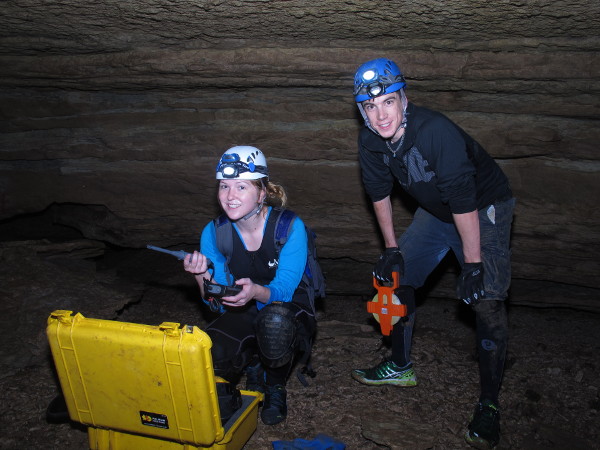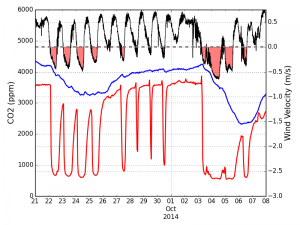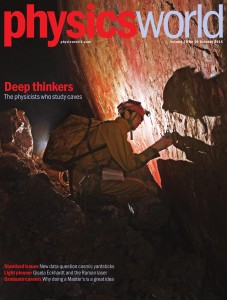
The Blowing Spring Cave Observatory is a field site that we use for a variety of research and educational purposes. Research at the site started with Kathy Kneirim’s PhD research examining carbon and E. coli dynamics at the site (Kneirim et al. 2013; Kneirim et al. 2015). Equipment to monitor dissolved and gaseous carbon dioxide, as well as air flow velocity and other basic environmental parameters, were installed in spring of 2014. Over 30 additional water quality and air temperature data loggers were installed during Covington’s Karst Hydrogeology course in fall of 2014, resulting in what may be one of the most heavily instrumented caves anywhere. A recent piece on the local NPR show Ozarks at Large featured our work at this site.
Ongoing work in the cave is focusing on interactions between carbon dioxide concentrations within the cave stream and cave ventilation processes as a part of Holly Young’s masters thesis work. The cave airflow is driven primarily by the chimney effect, where the entrance of the cave acts as a lower entrance. This means that fresh outside air is drawn into the cave during cool periods, whereas air blows out the entrance during warm outside weather. Preliminary data suggest that the periods of time when the cave stream is undersaturated with respect to calcite, and therefore capable of dissolving the limestone rock in which it is formed, are largely controlled by these airflow patterns.

Undergraduate research, begun in the Karst Hydrogeology course and continued by Alex Breeding, is studying cave air temperature dynamics within entrance zones and trying to quantify distance into the cave that air temperature is influenced by outside temperatures. Contrary to prior theoretical work, our new model and observational data suggest that this zone of external temperature influence expands over the duration of the winter. A few weeks of cave air temperature data are depicted in the animation below. The leftmost data point is outside temperature.
We thank the Bella Vista Village Property Owners Association for their helpful cooperation with this work and for access to Blowing Spring Cave.
